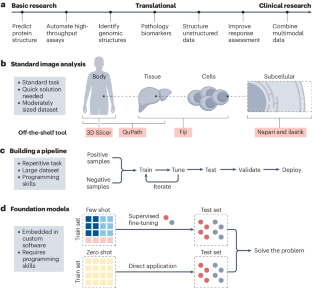癌症研究人员人工智能指南
IF 66.8
1区 医学
Q1 ONCOLOGY
引用次数: 0
摘要
人工智能(AI)已经商品化。它已从一种专业资源发展成为癌症研究人员随时可用的工具。基于人工智能的工具可以提高日常工作流程中的研究效率,还可以从现有数据中提取隐藏信息,从而实现新的科学发现。掌握这些工具的基本知识对每一位癌症研究人员都很有用。以传统生物科学为重点的研究人员可以通过现成的软件使用基于人工智能的工具,而那些更倾向于计算的研究人员则可以开发自己的基于人工智能的软件管道。在本文中,我们将为非计算癌症研究人员提供实用指南,帮助他们了解基于人工智能的工具如何为他们带来益处。我们传达了人工智能在图像分析、自然语言处理和药物发现方面应用的一般原理。此外,我们还举例说明了非计算研究人员如何开始在自己的工作中卓有成效地使用人工智能。本文章由计算机程序翻译,如有差异,请以英文原文为准。


A guide to artificial intelligence for cancer researchers
Artificial intelligence (AI) has been commoditized. It has evolved from a specialty resource to a readily accessible tool for cancer researchers. AI-based tools can boost research productivity in daily workflows, but can also extract hidden information from existing data, thereby enabling new scientific discoveries. Building a basic literacy in these tools is useful for every cancer researcher. Researchers with a traditional biological science focus can use AI-based tools through off-the-shelf software, whereas those who are more computationally inclined can develop their own AI-based software pipelines. In this article, we provide a practical guide for non-computational cancer researchers to understand how AI-based tools can benefit them. We convey general principles of AI for applications in image analysis, natural language processing and drug discovery. In addition, we give examples of how non-computational researchers can get started on the journey to productively use AI in their own work. This Review provides an introductory guide to artificial intelligence (AI)-based tools for non-computational cancer researchers. Here, Perez-Lopez et al. outline the general principles of AI for image analysis, natural language processing and drug discovery, as well as how researchers can get started with each of them.
求助全文
通过发布文献求助,成功后即可免费获取论文全文。
去求助
来源期刊

Nature Reviews Cancer
医学-肿瘤学
CiteScore
111.90
自引率
0.40%
发文量
97
审稿时长
6-12 weeks
期刊介绍:
Nature Reviews Cancer, a part of the Nature Reviews portfolio of journals, aims to be the premier source of reviews and commentaries for the scientific communities it serves. The correct abbreviation for abstracting and indexing purposes is Nat. Rev. Cancer. The international standard serial numbers (ISSN) for Nature Reviews Cancer are 1474-175X (print) and 1474-1768 (online). Unlike other journals, Nature Reviews Cancer does not have an external editorial board. Instead, all editorial decisions are made by a team of full-time professional editors who are PhD-level scientists. The journal publishes Research Highlights, Comments, Reviews, and Perspectives relevant to cancer researchers, ensuring that the articles reach the widest possible audience due to their broad scope.
 求助内容:
求助内容: 应助结果提醒方式:
应助结果提醒方式:


